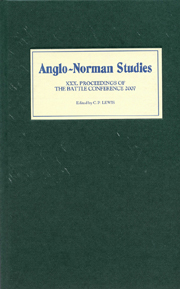Book contents
- Frontmatter
- Contents
- LIST OF ILLUSTRATIONS, MAPS, AND TABLES
- EDITOR'S PREFACE
- ABBREVIATIONS
- The Normans in Welsh History (R. Allen Brown Memorial Lecture)
- William Marshal, Lancelot, and Arthur: Chivalry and Kingship
- Grades of Ordination and Clerical Careers, c. 900–c. 1200
- Evesham J and Evesham L: Two Early Twelfth-Century Manorial Surveys
- Aspects of Church Reform in Wales, c. 1093–c. 1223
- Lay Charters and the Acta of Henry II
- Reinventing Normans as Crusaders? Ralph of Caen's Gesta Tancredi
- Kings, Lords, Charters, and the Political Culture of Twelfth-Century Wales
- Identifying the Warrior on the Pre-Heraldic Battlefield
- St Nicholas the Pilgrim and the City of Trani between Greeks and Normans, c. 1090–c. 1140
- The ‘Resurgence’ of Powys in the Late Eleventh and Early Twelfth Centuries
- Interpreter Families and Anglo-Welsh Relations in the Shropshire-Powys Marches in the Twelfth Century
- A Taste for the Antique? Henry of Blois and the Arts
Lay Charters and the Acta of Henry II
Published online by Cambridge University Press: 12 September 2012
- Frontmatter
- Contents
- LIST OF ILLUSTRATIONS, MAPS, AND TABLES
- EDITOR'S PREFACE
- ABBREVIATIONS
- The Normans in Welsh History (R. Allen Brown Memorial Lecture)
- William Marshal, Lancelot, and Arthur: Chivalry and Kingship
- Grades of Ordination and Clerical Careers, c. 900–c. 1200
- Evesham J and Evesham L: Two Early Twelfth-Century Manorial Surveys
- Aspects of Church Reform in Wales, c. 1093–c. 1223
- Lay Charters and the Acta of Henry II
- Reinventing Normans as Crusaders? Ralph of Caen's Gesta Tancredi
- Kings, Lords, Charters, and the Political Culture of Twelfth-Century Wales
- Identifying the Warrior on the Pre-Heraldic Battlefield
- St Nicholas the Pilgrim and the City of Trani between Greeks and Normans, c. 1090–c. 1140
- The ‘Resurgence’ of Powys in the Late Eleventh and Early Twelfth Centuries
- Interpreter Families and Anglo-Welsh Relations in the Shropshire-Powys Marches in the Twelfth Century
- A Taste for the Antique? Henry of Blois and the Arts
Summary
This paper deals with the acts of Henry II as a source for the production and use of charters by laymen in the twelfth century. Its starting point is the British Academy ‘Acta of the Plantagenets’ research project, and the immense value to historical research of this corpus of the acts of the early Plantagenet rulers.
The subject index currently in preparation will illuminate, among other things, the seemingly endless variety of customs, always interesting and sometimes picturesque or bizarre, mentioned in the royal acta. Some of these only occur in one single text, whether because they represent customs that were highly localized, or anachronistic and redundant, or because of misspellings of the names of customs that were unknown to the scribes or to later copyists. Others are very common, at least in documents concerning land in England, such as the award of ‘soke and sake, toll and team, and infangenthief’, the award of immunity from geld and danegeld, and the award of immunity from ‘toll, passage, pontage, and all customs’.
Such curiosities are few and far between in documents issued actually under the seal of Henry II because of the advanced bureaucratic tendencies of the royal chancery. This paper concentrates not on the curious and extraordinary, but rather on the routine and bureaucratic, thus going with the grain of the development of chancery practice rather than against it. Its topic is a commonplace phenomenon, the confirmation of charters.
- Type
- Chapter
- Information
- Anglo-Norman Studies 30Proceedings of the Battle Conference 2007, pp. 100 - 116Publisher: Boydell & BrewerPrint publication year: 2008



